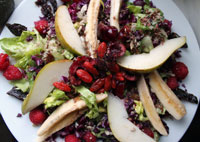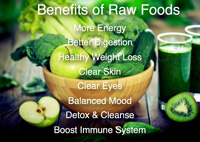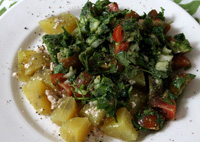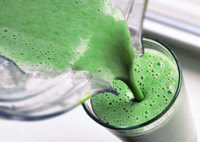Raw Food Diet
- Home >
- Raw Food Diet
Raw food diet is considered an extreme way of eating which can hold extreme benefits. A summary of key topics and all you need to know, spoken from personal experience. Pros and cons, how to succeed, pitfalls, benefits, the scientific view, recipes, links, raw food celebrities, etc.
You can browse the raw food diet articles below for inspiration or jump straight to our resource hub: 'Raw Food Diet - Everything You Need to Know'.

How to Succeed on Raw Food Diet
... what I and other raw food enthusiasts have learned the hard way.Zakhah: The Joy of Living Live
Possibly the healthiest group of people on the planet today, this raw food vegan community also has no crime and no locks on doors.How to Live on 40 Euros per Week as a Raw Foodist
Interview with Taz, a raw foodist living on the mountains of Spain.Queen Afua: Heal Thyself
A highly spiritual take on eating raw foods and live juice fasting. Includes some cooked natural dishes and herbal remedies as well. Book summary.Raw Food Challenge 2015, 25 Days
This raw food diet was slightly problematic, but I learned a lot. Brief summary of each day here with links to full diary notes.
Raw Food on a Budget
How to eat a healthy raw food diet on a $6-9 (£5-7) average per day, and how to transition without losing too much weight.
Interview with Dr. Joel Fuhrman
Dr Fuhrman pioneered the 'nutritarian' idea: eat foods which are high in micronutrients per calorie for health, longevity and avoidance of chronic disease.Raw Family
Victoria Boutenko found long-term raw food success for her and her family when she added green smoothies to their daily diet. Book summary with quotes.Sunfood Diet Success System
One of the most inspiring raw food books you could ever read. David Wolfe's masterpiece summarized, with quotes.Spirulina Revolution
An interview with Robert Henrikson, the CEO of Smart Microfarms, who pioneered spirulina farming in the USA over 30 years ago and now promotes microfarms around the world.100-Day Raw Food Challenge - Summary
A summary of my diary of living on raw foods on a budget, with detailed expenses and meals recorded. Challenges and successes explained. Regularly updated with future improvement tips.
22-Days on Raw Foods - Summary & Conclusions
My second raw food diet, back in 2011, avoided some of the problems I experienced on later diet experiments... Many benefits but some challenges also.How to Stop Aging
Dr. Brian Clement's lecture transcribed. He is the Director of the Hippocrates Health Institute raw food research centre and retreat.Raw Food Benefits
Here I keep a list of the benefits I have experienced from the raw food diet so far.Raw Food Weight Loss
Why raw food diet results in quick weight loss and success stories.Kefir Probiotic - Raw Food Champagne
How to make a simple, cheap and powerful probiotic at home to help balance your gut flora, to improve your digestion and nutrient absorption, and to strengthen the immune system.High Raw or 100% Raw?
The pros and cons of a high raw diet (50-90%) and a 100% raw diet evaluated.End World Hunger with Raw Foodism
On the politics of our food choices and how to ensure that nutritious foods are available to all.How to Gain Weight on Raw Foods
One of the most difficult problems many raw foodists face is excessive weight loss.Introduction to Raw Foods
My summary of topics essential to understand in relation to eating raw foods.Spirulina
The highest protein-content food on the planet happens to be vegan: spirulina algae.'Near Fruitarian': Brian Rossiter - A Story of Natural Healing
Interview about healing chronic back and neck pain with exercises and 100% raw food diet. Life changing philosophy, raw food tips, and how to be free.Live Spring Water Benefits
The unbelievable benefits of drinking good, clean water with intelligence, summarized from various sources.Juice Fasting
A collection of articles on this website on juice fasting.Moein, Raw Foodist Interview
An Iranian raw foodist, author and an activist, currently living in Malaysia, Moein answered my many tricky raw food questions, providing great insights into raw vegan living.Joel Fuhrman: Eat for Health
A high raw diet plan emphasizing the importance of micronutrients over calories. Our health is not controlled by our genes. Book summary.
Raw Sushi Recipe
This protein-rich and starchy-carb-free dish will never get boring because there are so many different flavour varieties that can be made.
Fiber Can Cause Dehydration
I noticed that I get dehydrated after eating large, raw salads and also experienced other symptoms of indigestion.Enzyme Nutrition
Book summary on Dr. Edward Howell's classic on the research and health benefits of enzymes, which are naturally present in raw but not cooked foods.Barbara Wren: Cellular Awakening
How your body holds and creates light. Book summary.The existence of biophotons in our cells has been proven by MIT researchers.
My Favourite Green Smoothie Recipe
Green and other smoothie recipes to kick-start your health and reduce time spent in the kitchen.Foods That Heal
A collection of articles on various healing qualities of foods and superfoods.Tony Wright, Graham Gynn: Left in the Dark
The hidden powers of the right brain hemisphere. On DMT, pineal gland, third eye, subconscious mind, raw foods, etc. Book summary.
First Week on Raw Foods - Summary & Conclusions
Summary of my first ever raw food diet - in 2011 - with some quite important findings - good and bad - during mere 7 weeks of cleansing.
Raw Cherry Tomato Soup Recipe
Super-quick and tasty tomato soup recipe, a perfect raw food dish for when you are in a rush.
Probiotic, Fermented Apple Chutney Recipe
This chutney becomes sweeter as it ferments, but it has no added sugar or other nasties. The probiotic benefits enhance manifold as it ferments.
Pea Chutney Recipe
Protein-rich, raw, cheap and sugar-free recipe, which is surprisingly sweet and great as a main dish, when mixed with lettuce. Works as a side dish too.Raw Food Diet - Everything You Need to Know
Raw food diet is considered an extreme way of eating which can hold extreme benefits too, at least for some people. This article covers a summary of key topics to do with raw foods and summarizes all you need to know, based on eight years of research and personal experience.

Copyright: Pelagos. To purchase the full-resolution version contact us.
I got interested in raw food diets when moving from Europe to study at the UC Berkeley, California. I wanted to try a raw food restaurant just out of interest and was fully expecting to be served salads and nothing else. To my surprize the menu at Cafe Gratitude contained pizzas, pastas, cakes, crackers, cheeze - and the dishes were very tasty, although unusual. The staff at the restaurant appeared very healthy and had an energetic manner and a sun-kissed 'glow' to them (more than in other Californian restaurants!).
Despite insufficient scientific evidence and research, there is much evidence from testimonials that the raw food diet can be a powerful healer of disease and help people 'grow younger', at least in appearance and energy. It may not suit everyone, as different people thrive on different diets, but there is enough data to suggest that raw foods can trigger excellent health! Further scientific research is much overdue.
Topics discussed in this article:
- Introduction to the Raw Food Diet
- Are Raw Foods Healthy?
- Raw Food Diet Benefits
- Dangers of Raw Food
- What Do Raw Foodists Eat?
- Raw Food Restaurants
- Raw Food Recipes
- Does Raw Food Diet Reverse Aging?
- Is Raw Food Diet Vegan?
- The Controversy Surrounding Raw Foods
- Documentaries about the Raw Food Diet
- Raw Food Diet Magazines
- Inspirational Raw Food Articles
Introduction to the Raw Food Diet
Raw food diet consists of eating a high percentage of your food raw and uncooked. The dishes are typically made from fruit, vegetables, berries, nuts, seeds, sprouted grains, herbs, and some more exotic 'superfoods', such as algaes, seaweeds, mushrooms, etc. Raw foodists often include dried, frozen, blended, juiced, pickled, sprouted, and fermented foods in their diet. Some of the dishes a raw foodist might eat on a daily basis include smoothies, salads with various dressings, sprouted grains and seeds, such as 'raw porridge' or 'chia seed pudding', various pastes and nut cheezes, cold or slighly warmed soups, freshly-squeezed juices, ice creams, nut mylks, pizzas, kale crisps, etc. Some raw foodists include raw alcoholic beverages, syrups (such as agave nectar from a cactus plant), raw unpasteurized dairy products or even raw meat in their diet. Eating raw meat, eggs or fish is less common, however.
There are various versions of the raw food diet. Most raw foodists don't eat 100% of their food raw but are 'high-raw', where typically some 70-90% of the food is eaten raw. Many raw foodists choose to eat fully vegan and plant-based whereas others eat dairy, eggs, insects, sushi fish, steak tartar, honey and other animal products raw. Fruitarians eat 80-90% of their food as fruit, including only small quantities of greens, nuts and seeds.
Although raw foodists can process their own foods by blending, juicing, dehydrating, freezing, pickling, etc., they typically shun industrially processed foods, especially where high temperatures are involved. Food is considered raw if it hasn't been heated to over 104 degrees Fahrenheit (40 degrees Celcius). Therefore foods can be eaten warm but a higher heat that would damage the cellular structure of the food, some nutrients, enzymes and bacteria is avoided.
Hygiene is important when following the raw food diet because heat cannot be used to kill pathogens. Foods can be preserved by using freezing, pickling, salt, syrup, refrigeration, alcohol, antibacterial plants (such as ginger and garlic) or dehydration, however.
Are Raw Foods Healthy?
There are many reasons why eating a raw food diet can be very healthy. A summary of the key points is provided below.
Diet High in Fruit and Vegetables
A raw food diet is naturally high in fruit and vegetables since they form the basis of all meals. The National Health Service (NHS) in the UK recommends a minimum of five servings of fruit or vegetables per day. NHS also agrees, however, that there is enough research evidence to prove that 10 portions of fruit per day have greater health benefits. (One portion is approximately what you can fit in the palm of your hand.) Research on the 'Blue Zones', which are the areas of the world with the longest living people, showed that those with highest life-spans tend to eat mainly plant-based, with up to 95% of their diet made up of vegetables, fruits, grains, and legumes.
Nutrients are Not Damaged by Cooking
Certain nutrients in foods can be damaged by cooking and the raw food diet avoids this problem. Among the nutrients that can be damaged by heat are: Vitamins A, B, C, D, E and K; certain minerals, such as potassium, magnesium, sodium, and calcium; as well as Omega 3 and other beneficial fatty acids. While cooking at lower temperatures and for shorter periods helps to reduce the nutrient loss, fresh raw foods retain all the nutrients in an undamaged form.
The Journal of Nutrition reports that proteins and amino acids can also become 'less digestible' as a result of heating.
On the other hand, lycopene in tomatoes, which is an anti-oxidant, can become more bio-available to the human body when the tomatoes are cooked, so raw is not automatically better for every nutrient. In fact, other antioxidants can become more available to the human body through cooking also, so "comparing the healthfulness of raw and cooked foods is complicated, and there are still many mysteries surrounding how the different molecules in plants interact with the human body", as the Scientific American reports.
Raw Foods are Higher in Fiber
There is a tendency for people to eat more and more processed foods, which tend to be low in fiber. "Fiber appears to reduce the risk of developing various conditions, including heart disease, diabetes, diverticular disease, and constipation", as summarized on the Harvard University, School of Public Health website. Diets high in plant-based foods, such as the raw food diet, tend to be much higher in fiber than the average Western diet today.
Raw Foods are Fresh and Unprocessed
While the main principle of raw foods is that food should never be heated to higher level than 40-48 degrees Celcius (104-118 degrees Fahrenheit), most processed foods are typically avoided also, including canned foods, mainly because they may include non-raw ingredients, contaminants (e.g. aluminium from the can) and/or preservatives and additives. Therefore most food is eaten raw.
Pasteurized foods - such as juices, milk and cheese - are avoided because the process of pasteurization involves heating the food to a high temperature. These foods can be found unpasteurized also, however, in which case they would be considered raw foods. Foods that have been dried in high temperatures are considered damaged also, but foods dried in low temperatures or sun-dried are considered healthy. Processing methods where the food is greatly altered or gone through a chemical process are usually avoided, since they tend to be more difficult for the body to utilise. Raw foodists typically consider most lab-made preservatives, flavourings, colourings and other food additives to be either harmful to the body or not proven safe.
Due to lack of processing and preservation, most raw foods have to be eaten fresh or within a few days of preparation. (Exceptions are pickles, ferments, frozen and dried foods, as well as some other more traditional ways of preserving food.) Fresh and unprocessed foods tend to be higher in nutrients than older/processed foods. Also, industrial processing and food additives have been shown to cause sensitivity and allergies in some people.
Raw food diets tend to exclude refined sugars, refined flours (e.g. white flour), white rice, rolled oats, wheat pasta, and many other foods considered too 'processed', the diet is mainly a wholefood diet which brings its own benefits. For example, wholefoods don't tend to spike blood sugar as quickly as 'white' grains and sugar do.
'Junk' foods are avoided
It is very difficult to think of a food that could be considered 'junk food' in its natural, wholefood, raw form. The more 'industrial' foods which can be difficult to digest and have unhealthy ingredients are completely avoided on a raw food diet. This fact alone can be a big part of the reason why many people experience raw food diets as 'healing'.
Plant-based Foods are High in Anti-oxidants and Phyto-nutrients
The antioxidant content of raw, fresh plant based foods is typically high. In addition, plants have within them many phyto-nutrients (i.e. plant-nutrients), which have been proven beneficial to human health. Some phyto-nutrients include: carotenoids, curcuminoids, flavonoids and lignans, while more will be discovered over time. The Mayo Clinic explains that phyto-nutrients in blueberries, for example, "may help prevent chronic diseases, such as heart disease, diabetes and some cancers."
Some anti-bacterial qualities of foods are destroyed by cooking
For example, allicin in garlic - which is responsible for garlic's anti-bacterial, anti-viral, anti-fungal and anti-parasitic effect - is destroyed by cooking.
Raw foods may help bacterial diversity in the gut
Plant-based foods, when grown in clean nature, can have beneficial bacterial on their surface which can help improve gut health and strengthen the immunity and digestion. Bacterial diversity in the gut has even been linked to good mental health.
Cooking can generate toxins in food
Heat above 44 degrees Celcius can burn human skin and in a similar way it can harm other living things, including plants. While it is generally accepted that deep-frying or barbequing food can create carcinogenic compounds and dangerous 'free radicals', it is less well-known that even 'gentler' forms of cooking, such as boiling or steaming, can make some nutrients in food more difficult to digest, or even create toxins in foods.
Personally, I have found that my body can tolerate raw sugars and carbohydrates in foods fine, while cooked sugars and carbohydates cause various problems, such as bloatednes, gas, bags under eyes, tiredness, and quick weight gain. Therefore I've come to believe that the sugars are somehow damaged when the food is heated.
Raw foods can be easier to digest because of plant enzymes
Digestive enzymes are produced by the human body and are used for digesting food, as confirmed by the Harvard University's Harvard Health Letter. The article also explains that digestive enzyme supplements have helped with digestive complaints when a person's body is not producing enough enzymes naturally. Some of the enzymes needed for digestion are amylase, protease, lipase and lactase.
Raw foods also have enzymes in them (plant enzymes), which are made ineffective by heat above 117°F (47°C). Many raw foodists believe, following Edward Howell's work in the 1980's, that the plant enzymes are an important help for human digestion, help us produce less digestive enzymes in the pancreas and therefore preserve energy. Furthermore, raw food diet proponents believe that the enzymes in raw foods make them easier to digest, therefore reducing the burden on human digestive system (especially important when this system is compromised) and resulting in better absorption of nutrients.
Critics of this theory believe that plant enzymes are destroyed by the stomach acids and therefore won't help with digestion. Some of the digestive enzymes supplements that have been shown to help digestion, on the other, have coatings which protect them from the stomach acid.
As mentioned earlier, I find that my body struggles with digesting carbohydrates properly when cooked, but the same problems completely disappear when the carbs are eaten raw - whether starchy carbs such as banana or sweet potato - or sugary fruits. The enzyme theory would be one possible explanation for this situation but there are other possible explanations as well - for example, that the carbohydrates are altered by cooking and not suitable for my system at this point in time, due to imbalances.
If the enzyme theory could be conclusively proven, it would be a major breakthrough in understanding the raw food diet, and I look forward to hearing more about this.
Benefits of Raw Foods
People following the raw food diet not only report amazing health benefits but many (not all) also tend to look healthier, younger and more energized after following the diet for some time.
The most commonly reported benefits are higher energy levels, reversal of various health conditions, more youthful appearance, better exercise performance, more mental clarity and quick weight loss.
I experienced all of the above but among some of the most powerful raw food benefits in my experience was the diet's influence on my moods. My mind felt more balanced, my focus was better and I felt a notch happier through all the day's challenges and joys when practising raw foodism.
I keep a more detailed list of all the different benefits I and others have experienced through eating raw foods here: Raw Food Diet Benefits.
Dangers of Raw Foods
Unfortunately there are dangers to following the raw food diet also, which are important to know about. While almost everyone in the world eats some raw foods, too high quantities of them will not suit everyone. Others may be able to succeed on high raw diets and avoid the below dangers by careful research, planning and experimentation.
- Losing too much weight. The raw food diet eliminates many high-calorie foods and many find that food cravings are also greatly reduced. As a result weight gain can be quick and fairly easy to achieve while on a raw food diet. Unfortunately, however, many 100% raw foodists find that they lose too much weight. Some further thougths on this topic are provided here: "How to Gain Weight on Raw Foods".
- Reduced or complicated social life. Food is an important part of social life and if your diet is very different from other people it can cause some difficult situations/ stress. Of course you can find new raw foodist social circles too but many people decide to also eat some cooked foods for social reasons.
- Extreme diets can lead to obsessions with food or appearance, or to eating disorders. It's best to consult a qualified Dietitian to ensure that your diet is well-balanced if you have any concerns.
- Certain raw foods cannot be eaten with certain medications or conditions. E.g. greens can thin the blood so may not suitable for those with blood thinning medication; iron in spinach may not be suitable for someone with genetic tendency to too much iron; raw broccoli and other cruciferous vegetables can slow down thyroid function; etc. Check with your doctor.
- It is safest to eat a varied diet. Raw food diet can become too restricted and nutrient deficiencies may result. Therefore supplementation with B12 vitamin, as well as others, may be needed. This is a complicated issue and seems to be the main reason why nutritionists don't recommend 100% raw food diets in the long-term.
- Some high-calorie foods may be needed if you do a lot of exercise or physical work. Bananas and other fruit, fruit juices, dehydrated fruit and sweet potato, among other things, could help to provide quick energy but without having personal experience in this I can't say if it would be enough.
- It can be difficult to meet your protein needs on a raw food diet, as nuts and seeds may prove to be too high in fat in large quantities. Greens can be a good protein source but personally I prefer to include a pea-protein powder in my diet, even though it's probably heat-dried and processed.
- Sudden change in diet can cause various symptoms you didn't have before.
- Not all raw foods are healthy. There are certain foods that are toxic raw, such as white potatoes, pok choy, kidney beans, certain mushrooms, rhubarb leaves, cassava, bitter almonds, etc.
- Too many 'cold and damp' foods. Chinese medicine (TCM) advices against too much raw food because it's too 'cold' and can cause imbalances, especially in people with 'cold and damp' bodytypes. The meaning of 'cold' (yin) in TCM is somewhat different than the Western understanding of the word and is more akin to 'cool energy' than a specific temperature. To balance out the'cold' foods, warm teas, warm climate, saunas, hot baths, exercise, ginger, chillies, etc. can help.
- Too much fiber. While it's a more common problem (in the typical Western diet at least) to not get enough fiber in your diet, raw foodists can develop an opposite problem: too much fiber, specifically 'insoluble' fiber. This is present in abundance in vegetables and too much can cause both short- and long-term health problems, such as: digestive problems, gut imbalance, dehydration, and other issues. While many raw foodists say they do well eating large salads, most also include green juices, green smoothies and marinaded & pickled vegetables in their diet, where the fiber has either been removed or softened.
- Bacteria and other harmful micro-organisms in food. It is important to wash your foods carefully before eating raw. Especially with raw animal products, such as unpasteurized dairy and eggs, it's also important to ensure that they come from a farm where good food hygiene is observed and the animals are healthy. (Personally I would advice against eating any meat raw.) While cooking foods kills bacteria and micro-organisms, raw foodists have to be more careful. This can be quite a big problem when travelling in tropical countries or places where your body is not used to the local bacteria.
The answer to the raw vs cooked food debate may therefore not be clear cut. Most things in the real world do not fall into neat categories the way the human mind would like them to. While the raw food diet can clearly trigger huge health benefits in some or many people's health, it may not be suitable for everyone. Transitioning to raw foods slowly and including some high-quality, cooked wholefoods may be the safest option if you are interested in trying the raw food diet, while also taking into account the above points.
What Do Raw Foodists Eat?
The raw food diet takes in many forms but these are some of the foods that can be included into a raw food diet:
- Instead of dairy, 'mylk' made from almonds, cashew nuts, pecan nuts, sunflower seeds, coconut, etc. are used. Basic cheese can be made from combining nuts with nutritional yeast, oil and salt but many additional flavours can be added also. Sometimes this cheese is fermented by adding probiotics. Coconut cream can be used for cakes and other desserts while yoghurts can be made from unpasteurized dairy milk or coconut/ nuts. Unpasteurized dairy products are eaten by some raw foodists also.
- Some grains, such as amaranth, millet, quinoa (grain-like seed), buckwheat, kamut, wholegrain oats, wheat berries and wild rice are sometimes included in the raw food diet. They must be soaked, rinsed and sprouted first (instruction for each grain vary). The Harvard Health Letter explains that sprouted grains have more nutrients but recommends that grains are cooked after sprouting, due to danger of contamination. Blended raw porridge is one typical dish that can be included in the raw food diet - the consistency can be similar to normal porridge if it's put through a food processor.
- Bread can be made from nuts or seeds as a base, and dehydrated at low temperature. Vegetables or fruits are usually mixed in for better consistency. Flax seed (linseed) or bananas can provide 'glue' to stick the bread together instead of eggs. Because bread is dried (dehydrated) rather than baked with heat, it has to be flat 'cracker' type rather than fluffy thick bread. (The heat somehow removes water from the middle of the bread easier than a dehydrator).
- Sugar is usually replaced by dates, apple juice, stevia drops, dried figs, raisins, grapes, or other 'wholefood' sweeteners.
- Sweets, puddings, desserts, cakes. Flour is replaced by coconut flour, nut flour or flour made from seeds. Any crust is usually pressed together rather than baked or dehydrated. Raw cakes can either be frozen/chilled or room temperature.
- Raw chocolate is very commonplace and can be purchased in health food stores. Raw cacao beans are mixed with raw forms of sugar and fat. Chocolate mousse, chocolate sweets and cacao drinks can be included in the raw food diet and tend to be more nutritious than their cooked & processed counterparts, as well as have less additives.
- Either raw butter or a replacement such as avocado flesh or coconut oil is used.
- Many raw foodists include hot herbal tea in their diet, while others soak mint, fruit, ginger, berries or other flavourings in water for 'raw tea'.
- Raw Food 'Champagne'. While some raw foodists include alcohol (e.g. raw wine or spirits) in their diet, it doesn't seem to work for me, as it throws my body out of balance and starts unhealthy cravings. Other fermented beverages, such as 'water kefir' or 'kombucha' can be used for celebrations as an alternative for a bubbly, tart drink.
- Vegetable and fruit juices, green juices (made from lettuce or spinach), always squeezed just before drinking.
- Cold-pressed (extra virgin) oils & fats from olives, avocado, coconut, cacao, etc.
- Sprouted seeds, nuts and beans.
- Spreads, dips, salad dressings - these can be as sweet, salty, fatty, and flavourful as you like.
- Salads, including marinaded salads, fruit salads, herb salads, etc.
- Fruit and berries, dried fruit, fruit leather.
- Fermented foods, including sauerkraut, kimchi, fermented drinks, coconut or almond yoghurts, fermented cheeze, etc.
- Pickles: e.g. dried figs pickled in orange juice, raisins pickled in vinegary sauce, pickled ginger, pickled vegetables, etc.
- Kale chips and other dehydrated foods.
- Sea vegetables (e.g. seaweed) and algae.
- Coconuts and other nuts, including coconut juice.
- Exotic foods if available, such as: aloe vera, durian fruit, dragon fruit, etc.
- Herbs and spices of all kinds.
As a raw foodist you will either have to eat very simply, e.g. fruit, nuts, seeds and green leaves through the day - or you have to spend some time preparing 'gourmet' raw food dishes. 'Gourmet' raw foods can be purchased in restaurants and many health food shops but they tend to be a fair bit more expensive than other products.
Raw Food Restaurants
There are many restaurants which cater either exclusively for raw foodists or include both raw and cooked vegan foods in their menu. At the same time, most 'ordinary' restaurants will be able to serve you salads and/or fruit. You may just have to customise your dishes, e.g. to ask for a lemon slice instead of dressing, leave the cheese out, etc. Many restaurants and food shops now offer smoothies and juices also, but as a raw foodist you would only choose those if you knew the ingredients were fresh and no sugar, milk etc. had been added. Frozen fruit and berries can sometimes be pasteurized also.
Some restaurants which cater for those on a raw food diet, include:
Cafe Gratitude - Los Angeles & San Diego, California, USA
Wildfood Cafe, London, UK
Vantra Loungevity - London, UK
Juicebaby - London, UK
Afterglow by Anglow - Singapore
Frunatic - Singapore
The Living Cafe - Singapore
The Raw Kitchen - Perth, Australia
Maui Kombucha Cafe & Raw Vegan Fusion Cafe - Maui, Hawaii
Pixie Retreat - Portland, Oregon, USA
Senzafiamma - Rome, Italy
Raw Food Recipes
My favourite raw food recipe book is Any Phyo's Raw Food Essentials. You can see some additional raw food diet books (recipes and otherwise), on to right hand site of this website, with links to view reviews on Amazon.
Does Raw Food Diet Reverse Aging?
Many people who eat a very clean natural food diet start looking younger than they did before. The raw food diet has especially been credited for making people 'grow younger', both in looks and how they feel. However, according to the Blue Zones study, most of the people currently living longest on the planet eat majority plant-based diet with some animal products, and include both raw and cooked foods in their diets. I doubt, however, that a similar study has been done on long-term raw foodists and therefore we can't know whether they would live even longer.
I started quickly looking younger when eating raw foods during my past raw food trials. Many raw foodists are disease free even late in life. There are, however, at least two people I know of who were very long-term raw foodists and both conducted cancer. One has sadly passed away and the second one underwent chemotherapy and gave up raw foods. Therefore raw foods alone are definitely a cure-all, although the diet can have an clear youthening effect on many people, myself included.
Diet is only one aspect of longevity, however, and other things can have a big impact also, i.e. happiness, good social life, sufficient amount of challenges in life but not too much stress, staying active, keeping the mind active, spending time in nature, exercise, drinking plenty of fresh water and breathing fresh air, etc. Natural health has always been about balancing the whole body-mind entity and while raw foods can help many people on this journey there will be other challenges to overcome also, and imbalances to correct.
So the answer to whether raw food diet can reverse aging is: Maybe.
To read a promotional magazine on the topic (for free) by the Hippocrates Health Insitute, click on the image below:
Is the Raw Food Diet Vegan?
Raw foodists often follow a vegan diet but not always. Raw vegans eat plant-based foods only whereas other raw foodists may include raw, unpasteurized dairy, raw eggs (measures must be taken to prevent salmonella), raw fish (not advised, note that sushi is usually not raw), raw honey (note that honey is often heat treated, read the label), insects, and some very few people even eat raw meat (definitely not recommended).
Strict vegans don't wear wool because it comes from animals, don't use bees wax products, check E-numbers in foods for animal-based products, and don't wear leather. Some raw vegans might be less strict and e.g. eat honey and wear animal-based clothes despite being vegan otherwise.
The Controversy Surrounding Raw Foods
The raw food diet, just as any ideology, attracts fundamentalists as well as those with a more balanced view. Despite the huge potential in raw foods to change many people's lives for the better, those who believe that it's a cure-all or almost a 'holy' doctrine with no faults will run into trouble sooner or later. Raw foods are not perfect, just as nothing in life is, and in my view the great controversies surrounding the raw food diet have to do with the more fundamentalist viewpoints, such as:
- Is raw food the perfect diet for humans? Yes or no answers to this question tend to fail for a variety of reasons. 1) Humans bodies have at the very least adjusted to eating cooked foods over thousands of years, so raw foods that were tolerated previously are not necessarily tolerated anymore. 2) Our genetics influence how our bodies break down food and what nutrients we need so some people are almost certainly better able to 'tolerate' cooked food than others.
- Is cooked food poison? Some early raw foodists were of the opinion that cooked foods kill us slowly and cause disease. However, many people seem to live very healthy lives including many cooked foods into the diet. They may be behind some/many of the health problems of today but they are not all categorically poisonous.
- Are all health problems while on 100% raw food diet 'detox' symptoms? While you can get certain detoxification symptoms (herxheimer reaction/ cleansing reactions) when changing your diet suddenly to a less toxic one, there are also many symptoms that can be caused by not eating enough, eating foods you are intolerant of, nutrient deficiencies, eating foods difficult to digest, eating too much fiber, eating foods not suitable for your health condition or medication, eating toxic or unhygienic foods, underlying conditions or imbalances, other life changes, emotional states, allergies, etc. Therefore be wary of those who blanket claim that any symptoms are down to 'detoxification'.
- Are human body's protein needs exaggerated? As it can be difficult to get large quantities of lean protein on 100% raw foods diet, there are many raw foodists who claim that we actually don't need that much protein and greens, sprouts, nuts and seeds in their wholefood, unprocessed form will be enough to cover our protein needs. More research is needed to see whether some people can live healthy this way but I personally prefer to include a vegan non-raw or part-raw protein powder supplement in my diet. Needless to say, this topic is very controversial since protein is recognised by dietitians, nutritionists, fitness professionals, specialist doctors and traditional wisdom as being a very important part of a healthy diet.
- Is the healthiest diet 90% fruit? Fruitarians believe that very low-fat, very low-protein and very high raw fruit diet eliminates disease and greatly enhances sport performance, among other things. In their view raw sugar is only harmful when too much fat is eaten. In my view fruitarian diet is impractical (since you have to 'train' your stomach to eat huge quantities of fruit) and probably dangerous.
Frederic Patenaude is a long-term raw food enthusiast and the author of a book called 'Raw Food Controversies'. Please see the link below for more information.
Raw Food Controversies
Frederic Patenaude's critical love affair with the raw food diet. 15 years of experience detailed with common pitfalls. Book summary and quotes.Documentaries about the Raw Food Diet
We have collated some of the best raw food documentaries in a separate article, with embedded video of trailers, or full documetaries when available:
The Best Raw Food Documentaries
Trailers of the best raw food and extreme health documentaries I have found. Updated regularly.Raw Food Magazines
Some magazines which specilise in or regularly cover the raw food diet, include:
- 'Healing Our World' by the Hippocrates Health Institute. It's a great magazine and you can get a free, paper-copy subscription.
- 'Lucuma'. Free to read online. Paper copies exist also, contact them through Instagram to enquire.
- 'Funky Raw'. The latest issue was published in Spring 2017 but the back issues are available to order as paper copies.
Continue reading....
Raw Food Diet Benefits
Zakhah: The Joy of Living Live
David Wolfe: Longevity Now - book summary
David Wolfe on Calcification
Brian Clement: How to Avoid Aging
We Recommend
Latest Articles
Most Popular Articles
Collection of Best Raw Food Articles
Juice Fasting Articles
Book Summaries
Natural Remedy Library A-Z
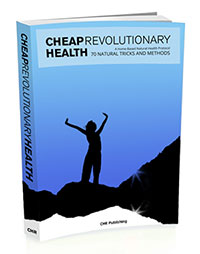
Edition 3.0: Cheap Revolutionary Health Ebook: 68 Natural Tricks and Methods - The Amazing Power of Small Everyday Tasks
To be safe, please consult your health-care provider before attempting self-treatment for health issues.
Navigation
Home Latest Articles Conditions A-Z Raw Food Juice Fasting Recipes My Health Journey Best ArticlesRaw Food Books
Full Raw Diet by Kristina Carrillo Bucaram:
How Not to Die - Discover the Foods Scientifically Proven to Prevent and Reverse Disease:

Raw Food - A Complete Guide to Every Meal of the Day:

The Sunfood Diet Success System by David Wolfe:

The Joy of Living Live:

Ani's Raw Food Detox - The Easy, Satisfying Plan to Get Lighter, Tighter, and Sexier... in 15 Days or Less:

Ani Phyo - Raw Food Kitchen: Easy, Delectable Raw Food Recipes:

Gabriel Cousens: Spiritual Nutrition: Six Foundations for Spiritual Life and the Awakening of Kundalini:

Queen Afua: Heal Thyself for Health and Longevity:

Contact Us:

Ulla is the Editor of Cheap Health Revolution, covering natural remedies and health solutions. Read more about Ulla and this website here: "About CHR"
Get in Touch


